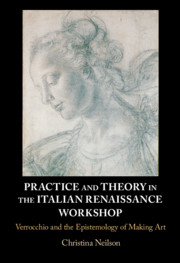 Practice and Theory in the Italian Renaissance Workshop
Practice and Theory in the Italian Renaissance Workshop Book contents
- Practice and Theory in the Italian Renaissance Workshop
- Practice and Theory in the Italian Renaissance Workshop
- Copyright page
- Dedication
- Contents
- Acknowledgments
- Introduction Verrocchio Experimentalist
- 1 Verrocchio's Ingenuity
- 2 Verrocchio's Medici Tomb: Art as Treatise
- 3 Bridging Dimensions: Verrocchio's Christ and Saint Thomas as Absent Presence
- 4 The Sculptured Imagination
- 5 Material Meditations in Verrocchio's Bargello Crucifix
- Conclusion
- A Note on Archival Sources
- Bibliography
- Notes
- Index
Conclusion
Published online by Cambridge University Press: 06 July 2019
- Practice and Theory in the Italian Renaissance Workshop
- Practice and Theory in the Italian Renaissance Workshop
- Copyright page
- Dedication
- Contents
- Acknowledgments
- Introduction Verrocchio Experimentalist
- 1 Verrocchio's Ingenuity
- 2 Verrocchio's Medici Tomb: Art as Treatise
- 3 Bridging Dimensions: Verrocchio's Christ and Saint Thomas as Absent Presence
- 4 The Sculptured Imagination
- 5 Material Meditations in Verrocchio's Bargello Crucifix
- Conclusion
- A Note on Archival Sources
- Bibliography
- Notes
- Index
Summary
The conclusion argues that the unusual situation of the artist’s workshop, in which he worked in a variety of different media, was the precondition of Verrocchio’s practice. It also suggests how the materials with which the artist worked exercised certain agency over the final product. Yet the conclusions reached here do not assume that Verrocchio was an unthinking practitioner, led simply by his materials. Instead, I have explored the numerous levels on which Verrocchio’s engagement with his materials is manifested in and meaningful for comprehending his objects, concluding that to understand his practices, we must acknowledge the artist’s relationships with matter. What Verrocchio’s objects present to us are demonstrations of a Renaissance artist’s deep understanding of his materials as meaningful and mutable. But they also make clear how matter could be engaged with to make certain claims, the claims that could not be expressed in any other medium.
- Type
- Chapter
- Information
- Practice and Theory in the Italian Renaissance WorkshopVerrocchio and the Epistemology of Making Art, pp. 196 - 198Publisher: Cambridge University PressPrint publication year: 2019


